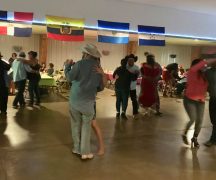By JAN LARSON McLAUGHLIN
BG Independent News
A traffic stop has landed a local man in jail, with the next stop likely deportation back to Mexico for being an undocumented immigrant. He has left behind three children who are U.S. citizens, a wife who has just been diagnosed with Lupus, and a local employer who is unlikely to find a documented American to take his place in the fields.
“Who’s winning with this,” said Beatriz Maya, from La Conexion of Wood County, who is trying to help both the family left behind and the husband being held in Geauga County jail which has a contract with Immigration and Customs Enforcement.
“We are losing a hardworking person, who is honest and never took anything,” Maya said. The family has lost its breadwinner, and the farmer has lost a worker. “Who’s winning?”
Fearful that they might be targeted by ICE, since the mother is also an undocumented immigrant, the family wanted to tell their story without revealing their names. Though the three children, ages 11, 14 and 16, are all proficient in English, their mom speaks primarily Spanish, so Maya provided translation at the family’s kitchen table in their very modest home that they hope to hang onto.
The family’s story is complicated, with one unwavering detail – the father being held by ICE and likely to be deported is a hard-working man.
The father came to the U.S. in 1996 to pick crops in Florida. Starting in 2002, he began migrating between Ohio and Florida to hit harvest seasons. At age 38, he has picked oranges, apples, strawberries, cucumbers and pumpkins, his wife said.
He started working picking crops on a large farm in Wood County, then changed jobs to work at a local dairy which meant year-round work so their children did not have to move during the school year. His latest job was working at an area orchard.
By all accounts, the man is a hard worker, with his previous employers often trying to get him back, Maya said.
He is quiet, barely makes eye-contact when talking, and is illiterate, Maya said.
“To be honest, he’s a very hard worker,” his wife said as she nervously fiddled with her fingers at the kitchen table. She is a petite woman with her hair pulled together in a neat bun, and a face full of worries. “Oh my gosh, he loves the heavy, heavy work.”
On days off, he is still up early in the morning, finding odd jobs or taking the kids to the apple orchard.
“He doesn’t like to be in the home resting,” his wife said through Maya.
That all changed for the family in January, when the wife, also from Mexico, woke up with a severe headache. “I opened my eyes and felt pain in my eyes. I couldn’t see,” she said.
The family went to a migrant farm workers clinic in Fremont. “They told her they couldn’t do anything for her,” Maya said.
They then went to an emergency room and were given drops that did not help. After a couple other medical visits, the family was advised to see a specialist in Columbus. There she was diagnosed with Lupus.
At the end of February, her family was headed back down to Columbus to pick her up.
“We were in the car and we were driving to see my mom,” the 11-year-old daughter said. “There was a police car behind us.”
The father was pulled over just north of Columbus, in Delaware, and tested for drunk driving. The results were negative. However, since he is an undocumented immigrant, he was taken into custody in front of his children.
The children, who were all born in the U.S., were taken to a nearby McDonald’s by a police officer.
“He told us if no one picked us up, we would have to go to a foster home,” said the daughter, who is in sixth grade. “I was scared.”
Meanwhile, the children called their mom at the hospital.
“I had no idea what was happening,” the mom said. “At the hospital, they told me I had to be very calm. I couldn’t even tell the hospital what was going on. I was so scared.”
With her sight significantly diminished, the mom could not drive her family home. But they were able to contact an uncle in the Columbus area who took the family home to Wood County.
“I was very concerned because they are minors,” the mom said of her children. “What was going to happen to them?”
This is not the first time her husband was been picked up for deportation. The last time was in 2010, when the family was stopped while driving through Woodville.
“I think they just looked at us and saw we were Mexican,” she said.
In that case, the police let the mother stay with their three young children, and just took her husband.
“He was sent across the border,” but was determined to return to his family, she said. Not only is his hometown in Michoacan, Mexico, very dangerous, but he also needed to support his family, she added.
“I was here by myself. My kids were much younger.”
He walked back to the border, then tried to get help crossing over.
“When he was at the border, I was getting calls that they wanted money or they were going to kill him,” his wife said. But he was able to make it back to Wood County two months later.
This time, their children are older and able to help, but his wife’s Lupus has made it impossible for her to continue her restaurant job, and unable to drive anywhere.
“I would like to be working,” she said. “When I go out, I have to hold one of my kids. I’m going to be losing my movements. I’m losing my hair right now.”
Worsening the situation is the fact that her husband cannot read or write, and is being held without bond. She has sent the jail enough money so he can make brief phone calls home each day. “Two to three minutes – no more than that,” she said.
“He has other people write in the jail what he wants to say to me,” she said. “He is very concerned because of the kids, because of my situation.”
Her husband was unable to fill out the form seeking political asylum, so his family applied for him.
The family has always tried to do the right thing, the wife said. Until now, they covered their children’s medical bills and didn’t apply for Medicaid for them.
“I never like to ask for any benefits or services,” she said. “I know that our kids are our responsibility – so I don’t want anyone else to support them.”
The mom still has no health insurance, and is trying to make minute payments for her Lupus care. “I don’t know how much I’m going to be charged by the eye specialist,” she said.
“I was thinking about selling my car, but it’s not working right now,” she said about the family’s 2005 Ford pickup.
Most of all, she worries about their children.
“If he is deported, I’m thinking I will have to go,” and that means the children will have to go to the country they have never even visited.
“Their future is not in Mexico. There is no future there for them,” she said. “They are very good students. They were born here, they want to stay.”
But without her husband, and with her Lupus, the family cannot afford their $600 monthly rent, $200 plus electric bill, and now $200 a month in prescriptions.
Their home has no luxuries. The kitchen and laundry share one small room, and the living room doubles as a bedroom for the one son. But at least it is a safe place to raise children.
“I’m really afraid of them going to Mexico. It’s very dangerous,” their mom said.
“His brother was kidnapped,” she said of her husband’s family. “That’s why we are so scared.”
And when families are deported from America, they are often at greater risk.
“All these gangs think they are bringing money back with them, so they are targeted,” she said. “The kids might get kidnapped when they go to school.”
The wife is disappointed in the nation she and her husband have chosen as a safe home for their family.
“It really makes me mad because they don’t consider anything,” she said in her quiet voie. “He didn’t commit any crime. They immediately send him to immigration. They didn’t give us any opportunities to show who we are.”
La Conexion is helping the family by providing transportation for the mom to her medical appointments, and collecting money for some of their monthly bills. The organization is also working with the mom to help her set up power of attorney for the children just in case she is deported.
The Latino organization is also trying to find an attorney or someone with ABLE to help with the father’s ICE case. But ABLE is “up to their ears” in deportation cases, Maya said. “They cannot take any more cases.”
Donations for the family may be sent to La Conexion, P.O. Box 186, Bowling Green, 43402, with the word “family” being written in the memo line.
Maya said the organization is able to help the family in the short term – but it’s beyond that she is worried about.
“I’m really concerned about their situation long term,” Maya said. “He needs to go back to work and be able to sustain his family.”





